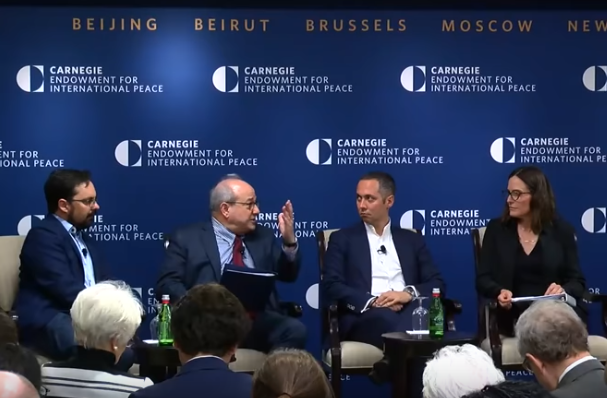Europe Might Take Another Step Back
If Spain fails to have the Common Position lifted or if it succeeds and Havana again turns down European economic cooperation, then Cuba wins once more.
On May 21, the Inter-American Dialogue co-hosted a discussion titled “Is the Venezuela Crisis Becoming a Proxy Conflict?” with the Carnegie Endowment for International Peace. The panel, moderated by CNN’s Bianna Golodryga, featured Dialogue president Michael Shifter and Dialogue senior fellow Rebecca Bill Chavez, as well as Alexander Gabuev of the Carnegie Moscow Center and Francisco Toro of the Caracas Chronicles and Washington Post. Discussion centered on the involvement of Cuba, Russia, the United States, and China in Venezuela.
Toro began the discussion by outlining the deep ties between Cuba and the Maduro government, which go far beyond oil dependency. Cuban involvement dates back to 2002, when former president Hugo Chavez sought Cuban advice after surviving a failed coup attempt. Since then, Cuba has been heavily involved in Venezuelan government operations. This is evident from the fact that President Maduro receives his daily intelligence briefings from Cuba, rather than from his own military, Toro argued.
Gabuev noted that although Russia has successfully inserted itself as a player in the crisis, Russia’s stake in Venezuela is fundamentally different from that of Cuba or even China. Rather than protecting their interests in Venezuela, which are few, Russian involvement stems from geopolitical strategy. Russia’s primary goal in Venezuela is to push into the United States’ ‘backyard,’ as the U.S. has done in Ukraine. To that end, Russia benefits from any press coverage that portrays them as pivotal actors in the crisis. As such, comments such as those by U.S. Secretary of State Mike Pompeo, stating that President Maduro was on the verge of fleeing Venezuela until the Russians dissuaded him, play right into Russia’s game, Gabuev stated.
The problem in Venezuela is largely Venezuelan in its origin. But the solution in Venezuela is now largely a global power solution. @MichaelShifter
— Andrew S. Weiss (@andrewsweiss) May 21, 2019
Shifter discussed how after several stalled attempts by interim President Juan Guaidó and the opposition to oust President Maduro, the idea of negotiations is gaining much more traction. Cuban and Russian involvement in Venezuela, although fundamentally different, makes them both very reluctant negotiators. Gabuev followed up by saying that Russia would actually benefit from sticking with Maduro until “the last bullet,” as it would show the Kremlin’s loyalty and make them desired allies of dictators around the world. For Cuba, the situation is more complex. While negotiating with the opposition would mean giving up what is essentially total control of Venezuela, Toro stated that by increasing sanctions on Cuba, the United States has given Cuba an incentive to come to the negotiating table.
Negotiations with China, on the other hand, are much more promising. Bill Chavez noted that Chinese involvement in the issue is primarily pragmatic, as they wish to protect their significant financial investments in the country. This makes them willing negotiators, and indeed the opposition have been successfully building a relationship with China.
Key to successful negotiations, however, is a united opposition. While the opposition has successfully built a unified coalition of over 50 countries, Bill Chavez argued that recent actions by the United States have threatened to unravel this hard-fought unity. In particular, the U.S. refusal to denounce military intervention, which is opposed by all other stakeholders, is a crucial point of contention. Shifter also noted that a lack of unity within the U.S administration presents a threat. There appears to be a fair amount of discord among all five of the senior administration officials working on the issue, including President Trump.
The discussion ended with a Q&A, which focused on Venezuela’s future post-Maduro. While there is a great deal of uncertainty on what this future will look like, it is clear that rebuilding Venezuela will require a decades-long international effort. Bill Chavez argued that China and the United States could both benefit from heavy involvement in the rebuilding process. Exactly how much rebuilding is necessary, however, will depend on the days following the end of the regime. If the Venezuelan military remains united, Shifter argued, then the transition will be more peaceful. If the military fractures, however, civil war will be imminent. As for what Venezuela in a civil war would look like, the short answer is ugly. As Toro said, “it’s not Vietnam, it’s Libya.”
If Spain fails to have the Common Position lifted or if it succeeds and Havana again turns down European economic cooperation, then Cuba wins once more.
After a 7.0 magnitude earthquake struck Haiti, the aftershock reached China in ways that few anticipated.The earthquake forced Chinese leaders to navigate the tricky politics of disaster relief.
The Summit of the Americas was marked by discord between the US and Latin American countries. What did it accomplish, if anything?
 Carnegie Endowment for International Peace
Carnegie Endowment for International Peace